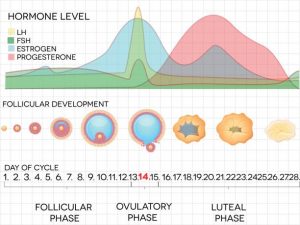Stress occurs because of a stretch to the normal body functioning. It is the body’s physiological and psychological response to changes in a person’s environment which may be physical, emotional, social, or cultural.
There is good stress which occurs with intentional physical activities and willfully participating in social and cultural activities. This kind of stress is essential for the day-to-day normal functioning of the body.
The bad stress comes from physical exertion, unrealistic demands from workplace, emotional trauma and torture, mental torture and things that negatively affect one’s wellbeing.
The hypothalamus responsible for controlling menstruation and it is extremely sensitive to external factors like exercise; sleep; family, social and cultural drama, stress amongst others. In its normal functioning, the hypothalamus releases chemicals which stimulate the pituitary gland which in turn stimulate the ovary to release the menstruation producing hormones: oestrogen and progesterone. When under stress, cortisol is produced, and it disorganises the activities of the hypothalamus to the pituitary gland and the menstrual cycle is either shorter or longer.
Physiological stress because of physical exertion, running unnecessary errands can lead to shorter menstrual cycle i.e., your period comes before its expected date. While Psychological stress because of emotional disturbance, mental trauma based on happenings in her environment can lead to longer menstrual cycle i.e., your period comes after its expected date. If the stress factor is not recognised and taken care of, it can lead to amenorrhea (absence of or missed menstruation after normal cycle).
Although stress alone cannot change the menstrual cycle, the associated factors such as poor nutrition, malnutrition, lack of sleep, freight and mental agitation that accompany stress are involved.

However, different levels of stress effects may be due to the timing. Higher level of stress during the follicular phase (First day of menstrual cycle to the ovulation day) is strongly associated with changes in normal reproductive function. The stress may cause the body to delay or entirely suppress ovulation which can also prevent conception. Stress during the Luteal phase (post-ovulation to menstruation) does not have much effect on menstrual cycle.
Therefore, the variation in length of the menstrual cycle is seen because of the Follicular phase being affected by stress.
One cannot eliminate stress from our normal everyday life but finding healthy ways to cope with excessive stress may help a woman have normal menstrual cycle and avoid irregular menstruation.
You may need to speak with your doctor on what you are experiencing, and some hormonal supplements or medicines may be prescribed for you.
You can also participate in regular exercise, restful sleep, eating healthy, partake in healthy social activities, confiding in family and friends to help reduce the effect of stress on your health.

Ezike Nonye is a Pharmacist who completed her Bachelor degree from University of Lagos (B.Pharm). She is currently exploring digital marketing analytics as a novel field in Pharmacy practice while also interning at the Federal Medical Center (FMC) Abeokuta, Ogun State, Nigeria. She is a graphic designer, a blogger and an entrepreneur. She is passionate about creating new things from nature and believes that there is no limitation to what you can achieve. She is a Christian and loves writing and open to new ideas and skills.

